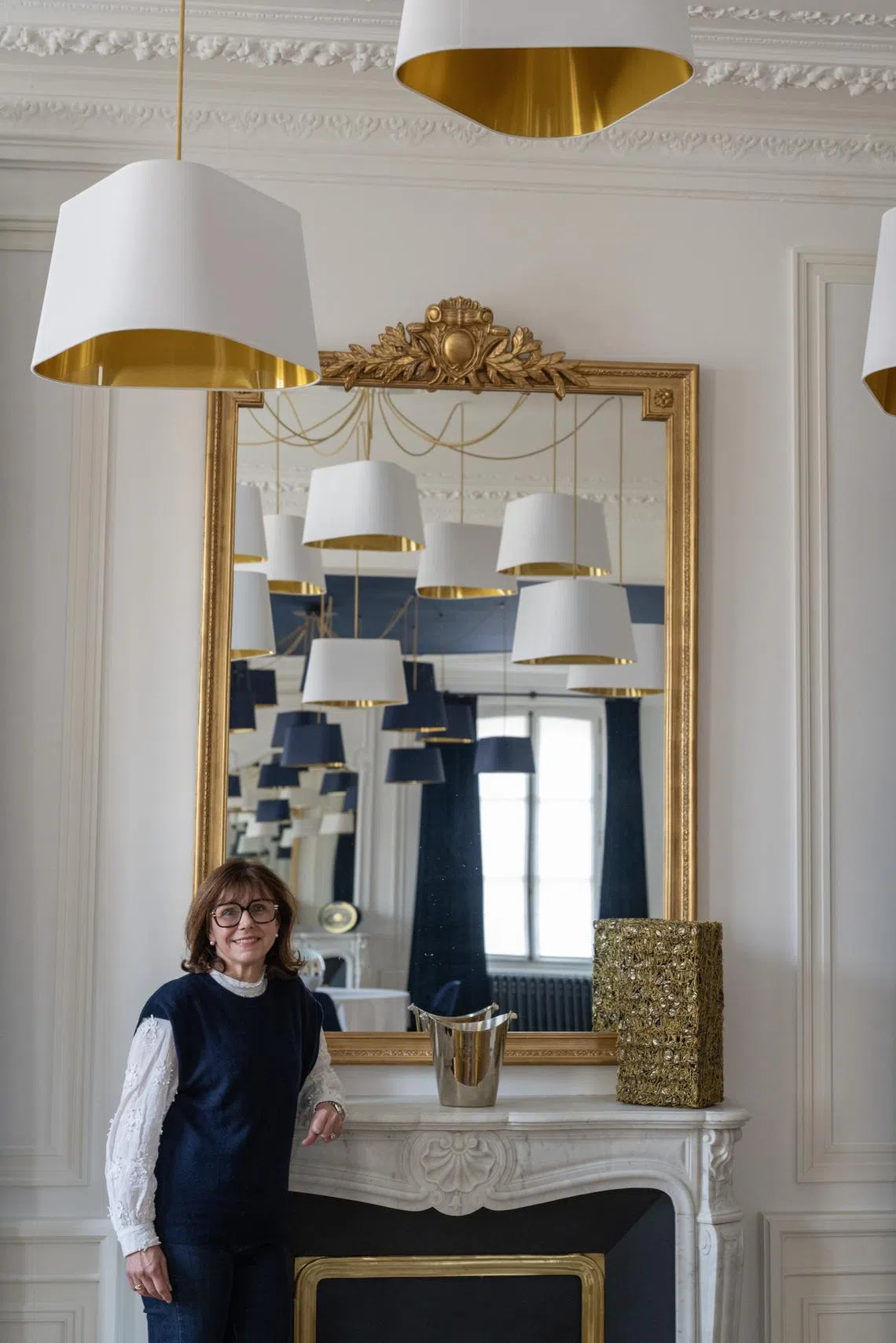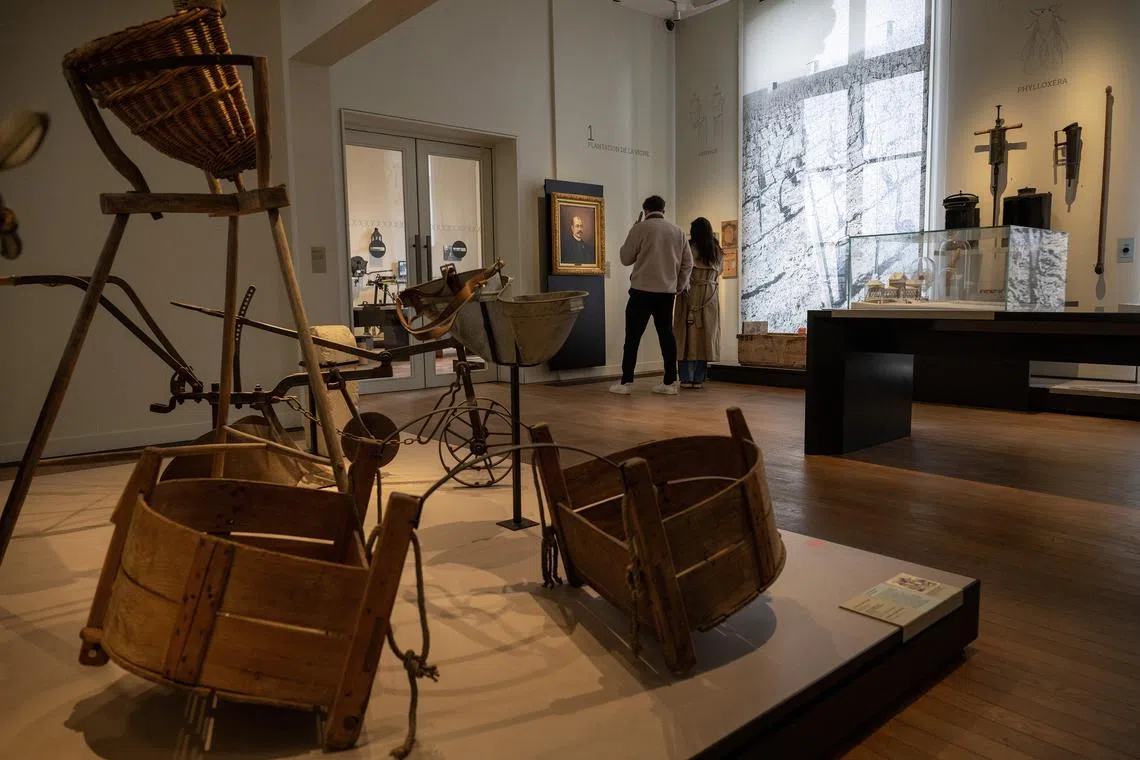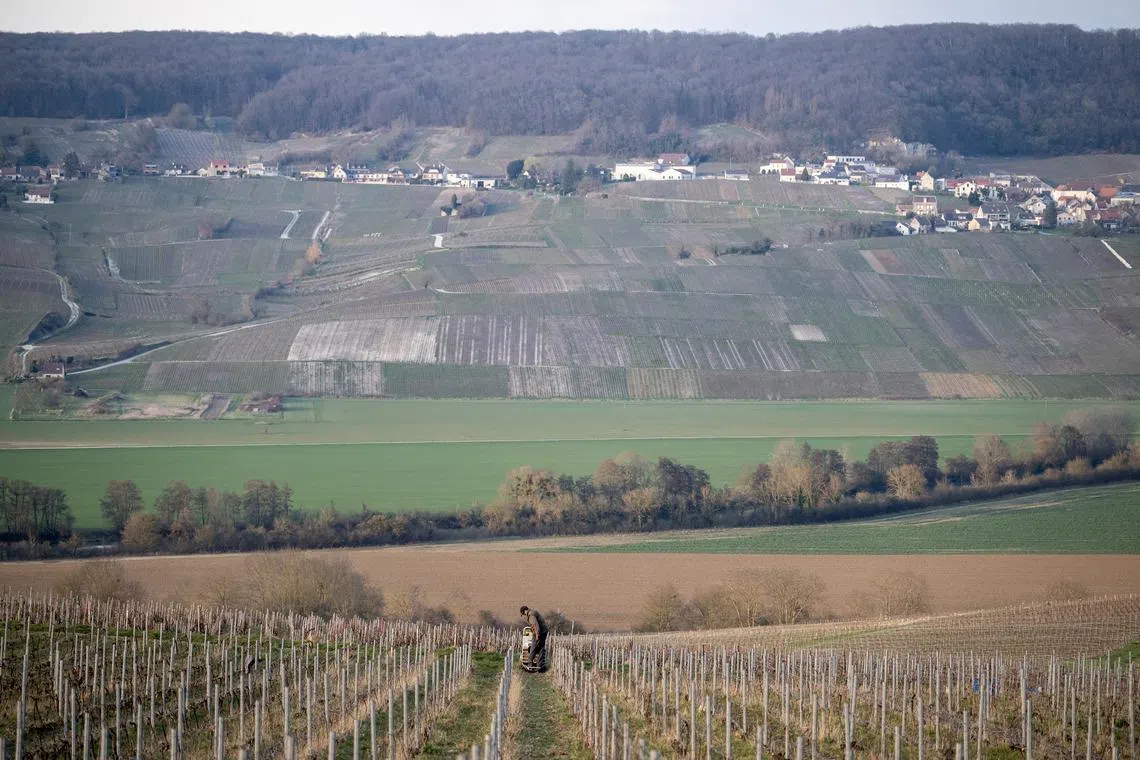Fear of Trump’s tariffs ripples through France’s champagne region
Sign up now: Get ST's newsletters delivered to your inbox

The United States is Epernay's biggest foreign market, with 27 million bottles shipped there in 2023.
PHOTO: JAMES HILL/NYTIMES
EPERNAY, France – French champagne producers do nearly US$1 billion (S$1.33 billion) worth of business with the United States every year. But on March 14 in Épernay, the world capital of sparkling wine, the only number on anybody’s lips was 200.
That was the per cent tariff that US President Donald Trump has threatened to impose on champagne and other European wines and spirits
The triple-digit menace landed like a thunderbolt in Epernay, rattling workers in nearby fields, producers in small villages and the venerable houses that line the Avenue de Champagne, Epernay’s central boulevard and a Unesco Heritage site that oozes tasteful wealth.
“A 200 per cent tariff is designed to make sure that no champagne will be shipped to the United States,” said Mr Calvin Boucher, a manager at Michel Gonet, a 225-year-old champagne house on the avenue.
With 20 per cent to 30 per cent of the 200,000 bottles it makes yearly exported to US wine merchants and restaurants, “that business would be crushed”, he said, adding that the price of a US$125 champagne would more than triple overnight.
Epernay sits in the heart of a region that produces the world’s finest bubbly. The US is its biggest foreign market, with 27 million bottles shipped there in 2023, valued at around €810 million euros (S$1.17 billion).
Chardonnay, pinot noir and Meunier grapes blanket the rolling hills and deep valleys of Champagne, which covers more than 330 sq km, from the city of Reims to the Aube river. The area is under France’s strict Appellation d’Origine system, which ensures that only the sparkling wine made here, using specific methods, can legally be called Champagne.
With more than 4,000 independent winemakers and 360 champagne houses, the region produces about 300 million bottles annually, with one billion more resting in cellars.
The biggest houses – including Dom Perignon, Veuve Clicquot and Moet & Chandon, owned by the luxury conglomerate LVMH Moet Hennessy Louis Vuitton – dominate production, and exports and account for one-third of total sales.
But such figures were of little comfort in the wake of Mr Trump’s threat.
Just off the Avenue de champagne, Ms Nathalie Doucet, president of Besserat de Bellefon, a speciality champagne house that exports 10 per cent of its premium production to the US, said the trade war made her anxious.
“We are waiting to see what happens, but it’s not good news,” said Ms Doucet, whose champagne is made with a laborious low-pressure process that gives it a crisp acidity and fine effervescence.
Champagne already had a tough year, with bad weather that had reduced the harvest. Consumption has declined as young people shifted habits and switched to cocktails and artisanal beer. Champagne sales have thinned since the pandemic, falling 9 per cent in 2024.
At the same time, she said, Europe is grappling with wars in Ukraine and the Gaza Strip. And now the trade war with the US, one of France’s traditional allies, over issues that have nothing to do with champagne, has made her feel like collateral damage.

Ms Nathalie Doucet, the president of Besserat de Bellefon, a speciality Champagne house that exports 10 per cent of its premium production to the United States.
PHOTO: JAMES HILL/NYTIMES
“It seems like a deliberate punishment,” said Mr Cyril Depart, owner of the Salvatori wine shop, just off the avenue, which offers a wide variety of artisanal champagnes. His wife was an export manager for one of the big champagne houses and had already been crunching numbers on the potential impact.
Ms Leah Razzouki, an Epernay resident whose family has worked in the champagne business for generations, said she was infuriated. “Many of our friends are small producers and they would be hit very hard,” she said.
The damage of a trade war would spread far beyond champagne’s regal houses, hitting US American importers and distributors and putting numerous small businesses at risk.
Mr Michael Reiss, president of Vineyard Road, a small distributor in Framingham, Massachusetts, that imports champagne and wines from Europe and distributes them in New England, said small businesses like his, including restaurants and retail shops, would be “very hurt”.
The unpredictable trade environment could force businesses to cancel planned investments, he added.
Adding to the pain, tariffs applied at the beginning of the supply chain can multiply, as each business handling the product marks it up accordingly, Mr Reiss said.
“So even a 25 per cent tariff can easily lead to a 40 per cent to 60 per cent increase in prices,” he said.
A 200 per cent tariff “would eliminate the possibility of people buying things that bring them joy in their lives”, he added.
Even inside the Champagne Museum bordering the avenue in Epernay, the chatter strayed to Mr Trump’s tariffs.
Ms Sacha Raynaud, whose family owns a small champagne house, had brought a friend to learn the history of champagne, which first appeared in the 17th century on the tables of royalty, giving the drink its nickname, “the king of wines”.
“French people are waking up to what’s happening in the United States, and starting to speak about boycotting American products,” she said.

The Champagne Museum, where visitors can learn the history of the drink, in Epernay, France.
PHOTO: JAMES HILL/NYTIMES
Similar worries circulated in the fields. Working in a buttery morning light, a dozen field hands secured knotted brown vines to wires ahead of the spring growing season on freshly plowed earth in the shadow of the champagne-producing town of Reuil, just west of Epernay.
Even these jobs were at risk, said Mr Patrick Andrade, who runs a small company that helps maintain champagne vineyards. The 12ha plot belongs to a small house that exports to the US, he said.
Should sales fall, wine producers would need fewer field hands, and there would be less work for tractor operators, cork makers and bottle makers. In the worst case, he added, it could force champagne producers to consider ripping out vines.
On March 14, French Foreign Minister Eric Lombard called the trade war “idiotic” and said he would travel to Washington soon. “We need to talk to the Americans to bring the tension back down,” he told French television.
France’s biggest champagne houses have stayed conspicuously silent, declining to say anything while waiting to see how Mr Trump’s threat would play out – and whether European officials could get him to back off.
Among them was LVMH Moet Hennessy Louis Vuitton, which sells nearly 35 per cent of its wines and spirits in the US. The company did not respond to a request for comment.
Outside LVMH’s Moet & Chandon mansion on the Avenue de Champagne, a group of Americans snapped selfies in front of a statue of Dom Perignon, the monk who invented champagne. Inside the stately building, no staff members wanted to talk tariffs.

Vineyards in Epernay, France, on March 14.
PHOTO: JAMES HILL/NYTIMES
Even so, locals whispered rumors that the big houses were upset by the tariff threat, but expected that it could possibly blow over.
After all, some said, Mr Bernard Arnault, France’s richest man and the head of the LVMH empire, which dominates much of champagne’s production, has a longstanding relationship with the US president and was invited by Mr Trump to his inauguration. Perhaps Mr Arnault’s friendship would prevail at the end of the day, they said.
But for now, that is all just speculation. The reality is that nothing is certain – and uncertainty is bad for business.
Back at the Michel Gonet champagne house, Mr Boucher pointed to a display of cuvees that were popular among customers in the US.
“It’s just a stressful situation because we don’t know if the tariffs will even happen,” he said. “It’s not good for anybody.” NYTIMES
Aurelien Breeden and Segolene Le Stradic contributed reporting.


